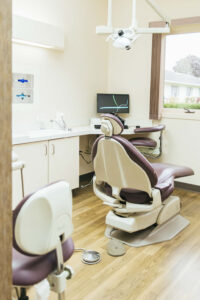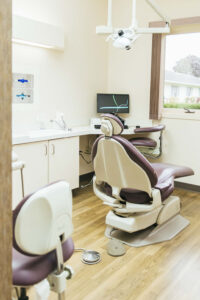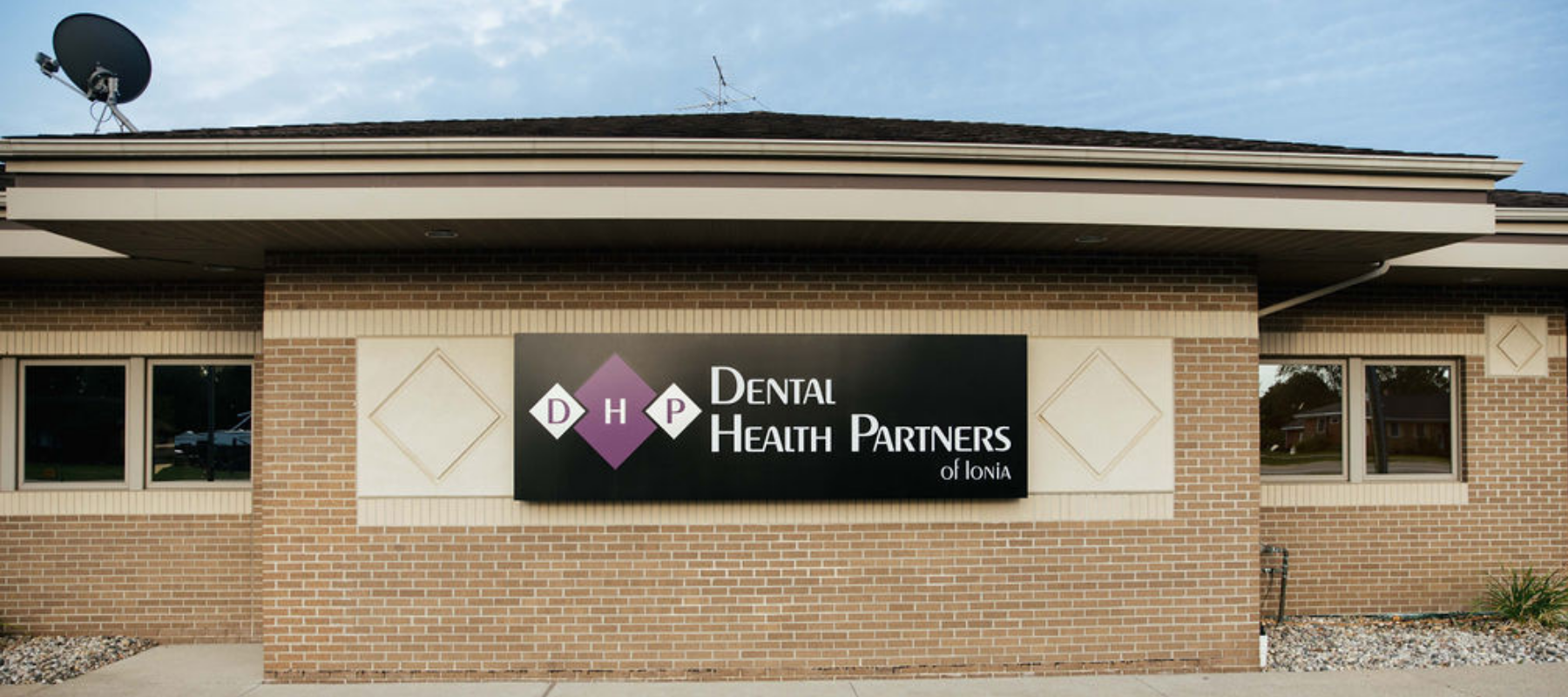Preventative Dentistry

Preventative Dentistry is the first line of defense when it comes to your oral hygiene. At Dental Health Partners of Ionia, our team is responsible for the prevention, diagnosis and treatment of a wide variety of conditions. This includes dental disorders and diseases affecting the teeth, gums and maxillofacial (jaw and face). General dentists primarily provide preventative care, and minor restorative therapy. Dentists also perform a wide array of other dental procedures.
The American Dental Association (ADA) recommends that patients visit their general dentist at least once every six months to ensure proper oral health and functionality. Regular oral health check-ups and maintenance help to prevent the development of serious dental problems.
Family Dentistry

The first line of defense against oral health problems in general dentistry, the dentist is the primary care provider for patients of all ages and is responsible for the prevention, diagnosis and treatment of a wide variety of conditions, disorders and diseases affecting the teeth, gums and maxillofacial (jaw and face) parts of the body. Even though general dentists primarily provide preventative care and minor restorative therapy, they are often able to perform a wide array of other dental procedures, including some minor cosmetic treatments.
Preventative Dentistry is the first line of defense when it comes to your oral hygiene. At Dental Health Partners of Ionia, the primary care provider for patients of all ages and is responsible for the prevention, diagnosis and treatment of a wide variety of conditions, disorders and diseases affecting the teeth, gums and maxillofacial (jaw and face) parts of the body. Even though general dentists primarily provide preventative care and minor restorative therapy, they are often able to perform a wide array of other dental procedures, including some minor cosmetic treatments.
Our dentists are highly educated and trained in multiple facets of dentistry, providing a variety of different services for you and your family including:
- Crowns and Bridges
- Partial Dentures
- Dental implants
- Gum disease (Periodontal) treatment
- Teeth Cleanings
- Dental fillings
If our dentists do not perform a certain treatment we will provide you with a specialist referral.
Tooth Replacement

Tooth replacements
Tooth replacements can mean a number of things and is different for each patient. Dental Implants, Bridges, Partial Dentures, and Complete Dentures can be completed in office at Dental Health Partners of Ionia.
Dental Implants
Dental implants are a restorative option that allow you to replace missing teeth with ones that look, feel and perform like your own. Implants are used for single crowns, bridges or dentures. Implants are synthetic structures that are placed in the area of the tooth normally occupied by the root. Implants are anchored to the jawbone or metal framework on the bone and act as a foundation for an artificial tooth or permanent bridge. In some cases, implants can be used to attach dentures.
Not everyone is a candidate for a dental implant, however. For a successful implant to take hold, a candidate must have proper bone density and have a strong immune system. In all cases, dental implants require strict oral hygiene.
Implants are so well designed that they mimic the look and feel of natural teeth. Implants are usually made of a synthetic yet biocompatible material like metal or ceramic.
Surgery is necessary to prepare the area for an implant and place the implant in the mouth. Following the procedure, a period of time is required for the implant to take hold and for bone tissue to build up and anchor the device. In some cases, metal posts are inserted into the implant during a follow-up procedure to connect the tooth. Since implants require surgery, patients are administered anesthesia and, if necessary, antibiotics to stave off infection following the procedure.
Like any restoration, implants require diligent oral hygiene and proper care to ensure they last a long time.
Bridges
Bridges are natural-looking dental appliances that can replace a section of missing teeth. Because they are custom-made, bridges are barely noticeable and can restore the natural contour of teeth as well as the proper bite relationship between upper and lower teeth.
There are several types of fixed dental bridges (cannot be removed), including conventional fixed bridges, cantilever bridges and resin-bonded bridges. Some bridges are removable and can be cleaned by the wearer; others need to be removed by a dentist.
Porcelain, gold alloys or combinations of materials are usually used to make bridge appliances.
Appliances called implant bridges are attached to an area below the gum tissue, or the bone.
Partial Dentures
Partial dentures are often a solution when several teeth are missing.
Removable partial dentures usually consist of replacement teeth attached to pink or gum-colored plastic bases, which are connected by metal framework. Removable partial dentures attach to your natural teeth with metal clasps or devices called precision attachments. Precision attachments are generally more esthetic than metal clasps and are nearly invisible. Crowns on your natural teeth may improve the fit of a removable partial denture and they are usually required with attachments. Partials with precision attachments generally cost more than those with metal clasps.
Complete Dentures
Complete dentures replace all the teeth, while a partial denture fills in the spaces created by missing teeth and prevents other teeth from changing position.
Candidates for complete dentures have lost most or all of their teeth. A partial denture is suitable for those who have some natural teeth remaining. A denture improves chewing ability and speech and provides support for facial muscles. It will greatly enhance the facial appearance and smile.
Complete or full dentures are made when all of your natural teeth are missing. You can have a full denture on your upper or lower jaw, or both.
Complete dentures are called “conventional” or “immediate” according to when they are made and when they are inserted into the mouth. Immediate dentures are inserted immediately after the removal of the remaining teeth. To make this possible, the dentist takes measurements and makes the models of the patient`s jaws during a preliminary visit.
An advantage of immediate dentures is that the wearer does not have to be without teeth during the healing period. However, bones and gums can shrink over time, especially during the period of healing in the first six months after the removal of teeth. When gums shrink, immediate dentures may require rebasing or relining to fit properly. A conventional denture can then be made once the tissues have healed. Healing may take at least 6-8 weeks.
An overdenture is a removable denture that fits over a small number of remaining natural teeth or implants. The natural teeth must be prepared to provide stability and support for the denture.
Periodontal Therapy

Periodontal exams are vital in the maintenance of your oral health as they are used to assess the health of your gums and teeth. They can help your dentist diagnose gum diseases, gingivitis and periodontitis. These exams can also reveal receding gums, exposed roots, tooth grinding and other problems, making periodontal exams vital to maintaining proper oral health. Regular dental exams are important as they can reveal evidence of gum disease in its early stages.
During your periodontal examination, your dentist will check:
Gingivitis is the first stage of periodontal disease that causes inflammation of the gums. Dental x-rays can determine if the inflammation has spread to the supporting structures on the teeth so treatment can be started to correct the problem. Periodontitis occurs when gingivitis goes untreated, which makes periodontal exams vital to preventing and putting an end to gum diseases.
Our dentists will complete a periodontal exam with each visit, emphasizing the importance of regular, routine visits to your dentist’s office.
Restorative and Esthetic Dentistry

If you have any restorative or aesthetic dentistry needs, including: fillings, crowns, veneers, or teeth whitening, our staff can help!
Composite fillings provide good durability and resistance to fracture in small-to-mid size restorations that need to withstand moderate chewing pressure.
Crowns are used to restore a tooth’s function and appearance following a restorative procedure such as a root canal.
A veneer is a very thin shell of porcelain that can replace or cover part of the enamel of the tooth. All-porcelain (ceramic) restorations are particularly desirable because their color and translucency mimic natural tooth enamel.
Whitening procedures have effectively restored the smile of people with stained, dull, or discolored teeth.
Dental Emergencies

In case of a dental emergency, please contact our office as soon as possible, and we will do whatever we can to take care of you.

